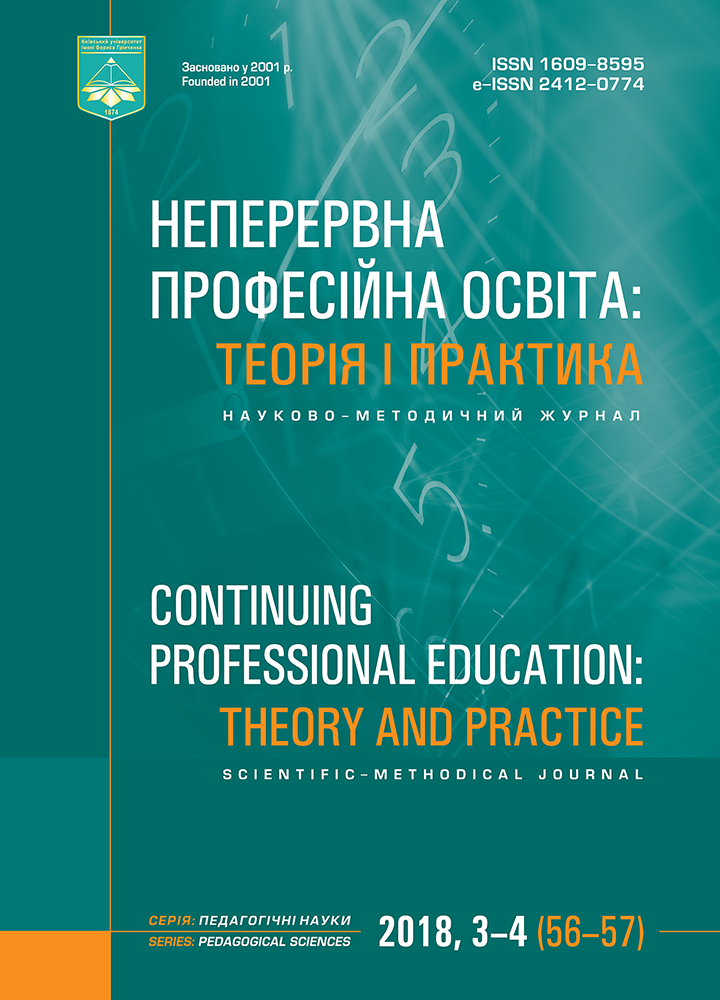STUDYING OF THE LEVELS OF FORMING COMMUNICATIVE COMPETENCE OF THE FUTURE POLICE OFFICERS
DOI:
https://doi.org/10.28925/1609-8595.2018.3-4.8993Keywords:
behavioural component, cognitive component, competence, communicative competence, educational process, emotional component, future police officers, innovation, mobility.Abstract
As a result of the rapid development of intercultural communication and global transformations taking place in the world in the 90s of the XX century, it became necessary to create a new personality with a new set of qualities and competencies that are urgently needed for the rational functioning in a multicultural world. For the successful performance of professional duties is not enough to be a specialist who knows job, today. Modern Ukrainian society needs educated professionals who can think critically and make decisions independently in a situation that requires a choice, that is, to be dynamic, mobile, creative. That is, the main feature of professional activity is its development, which requires constant updating and improvement of skills. Each specialist should acquire new knowledge and improve their skills, and, consequently, improve their professional qualities. According to research, professionals who are not engaged in improving professional competence, there comes a time in life when they have internal dissatisfaction with their activities and they need to improve professional skills, or even change their professional orientation.
Given the large variety of information technologies at all educational levels, it is not difficult to improve your professional level, and mobile learning is a way to solve a number of educational problems today. In this regard, the relevance of communicative education of future police officers is increasing. After all, the need to train a competent police officer capable of effective professional activity in a multi-ethnic environment is a priority in the training of future police officers in the parameters of European standards. The socio-cultural aspect in the professional training of future police officers is not only the formation of communicative competence, but also the space of interpersonal relations, in which a holistic culture of the individual is formed.
The article presents an analysis of the diagnostic results of the formation of communicative competence of the future police officer. The results demonstrate the levels of formation of communicative competence of future police officers in cognitive, emotional and behavioural components.
References
Gulchevskaya, V. G., Gulchevskaya, N. E. (1999). Sovremennye pedagogicheskie tehnologii [Modern educational technology]. Rostov-na-Donu, Russia: Izdatelstvo-RIPK i PRO (rus).
Kupchigina, I. M. (2014). Izuchenie kommunikativnoj kompetentnosti studentov pervyh i chetvertyh kursov, obuchayushihsya po pedagogicheskim napravleniyam [The study of the communicative competence of first and fourth year students enrolled in pedagogical areas]. Lichnost, semya i obshestvo: voprosy pedagogiki i psihologii: sbornik statej po rezultatam XXXVII mezhdunarodnoj nauchno-prakticheskoj konferencii. Novosibirsk, Russia: SibAK, 2 (37).
Milrud, R. P., Maksimova, I. R. (2000). Sovremennye konceptualnye principy kommunikativnogo obucheniya inostrannomu yazyku [Modern conceptual principles of communicative teaching of a foreign language]. Inostrannye yazyki v shkole, 4, 9–16.
Podlasyj, I. P. (2006). Pedagogika: 100 voprosov – 100 otvetov [Pedagogy: 100 questions –100 answers]. Moskow, Russia: VLADOS-press (rus).
Sedov, K. F. (2008).Ontopsiholingvistika: stanovlenie kommunikativnoj kompetencii cheloveka [Ontopsycholinguistics: the formation of human communicative competence]. Moskow, Russia: Labirint (rus).
Hutorskoj, A. V. (2013). Kompetentnostnyj podhod v obuchenii [Competence approach to learning]. Moskow, Russia: Ejdos (rus).
Mihajlova (Aleshina), E. S. (2001). Test Dzh. Gilforda i M. Sallivena. Diagnostika socialnogo intellekta. Rukovodstvo polzovatelya [Test J. Guilford and M. Sullivan. Diagnosis of social intelligence. User's manual]. Saint Petersburg, Russia: GP «Imatov» (rus).
Bojko, V. V. (2004). Energiya emocij [The energy of emotions]. Saint Petersburg, Russia: Piter (rus).
Rogov, E. I. Nastolnaya kniga prakticheskogo psihologa: V 2 kn. [Handbook of practical psychologist: In 2 books]. Moskow, Russia: VLADOS, 1999. Kn. 2: Rabota psihologa so vzroslymi. Korrekcionnye priemy i uprazhneniya (rus).
Bulvinska, O. (2017). Teacher communication competence: different theoretical approaches. Internauka, № 15 (37), Vol. 1, 20–23. DOI: https://doi.org/10.25313/2520-2057-2017-15 (eng).
Downloads
How to Cite
Issue
Section
License
Copyright (c) 2020 Alina Kudlay

This work is licensed under a Creative Commons Attribution-NonCommercial 3.0 Unported License.



